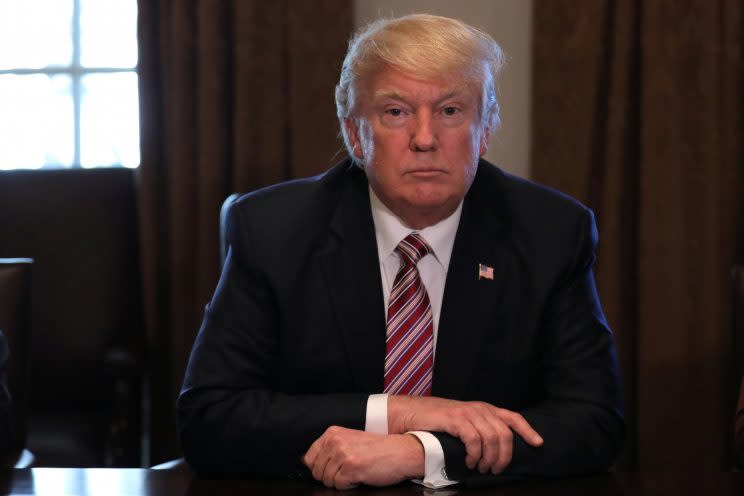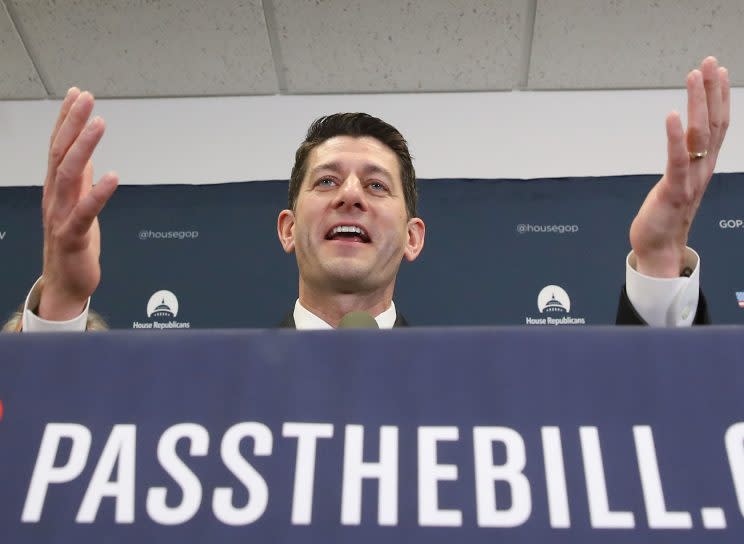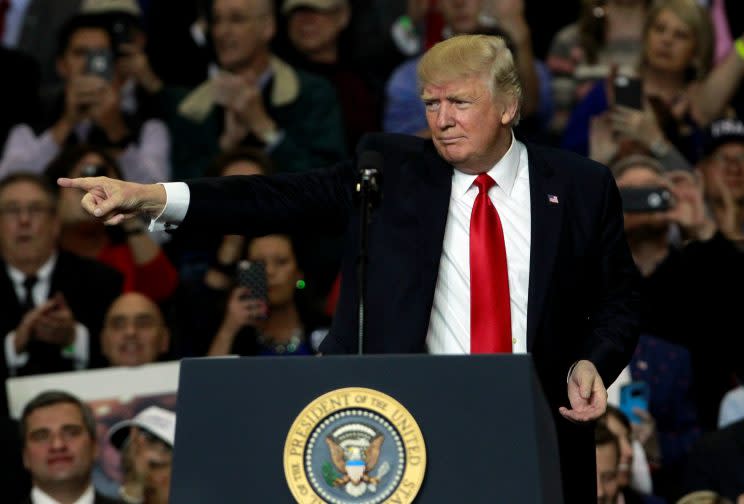Trump faces off against Washington Republicans used to saying no
WASHINGTON — President Trump, while trying to push a health care bill through Congress, is also trying to overcome a Republican political culture that for years has rewarded saying no to political leaders.
For most of the past decade, many Republicans in Congress who wanted to raise money or their profile have followed an easy playbook. They opposed then-President Barack Obama, resisted any attempts to work with him, and then campaigned for reelection based on the success of their efforts to obstruct him.
Outside groups such as Heritage Action, FreedomWorks and the Club for Growth — who are now opposing Trump’s health care replacement proposal, saying it does not go far enough — have followed this arc as well.
The health care fight, then, is about more than just one issue, said Josh Holmes, a former chief of staff to Senate Majority Leader Mitch McConnell, R-Ky., who still advises McConnell from the outside. It’s a crucial battle to determine whether Trump will be able to get anything substantive done during his presidency.
“If there is the incentive structure to register reservations publicly and not work productively, all it will do is repeat itself in perpetuity. That’s how the Hill works,” Holmes said.
In other words, Trump’s entire presidency may be at stake if the self-proclaimed master dealmaker cannot find a way to get his own party’s members in Congress to follow his lead now.

A top Republican in Congress, Rep. Patrick McHenry, R-N.C., called Trump “the closer” on Wednesday, suggesting that the president would manage to bring reluctant lawmakers over the finish line.
But not only do Republicans have a culture of resistance to following orders, the president and congressional leaders have fewer tools for putting pressure on dissenters now than they had even a decade ago.
Political parties don’t have the control over campaign funds that they used to enjoy. Changes to campaign finance law have pushed money away from the political parties and into outside groups that often reward lawmakers for ideological rigidity. Online fundraising has also allowed candidates to raise small amounts from voters directly. In the past, control of money was used by parties to punish or reward members of Congress based on their support for key issues.
In Congress, budget earmarks had long been a key lever the leadership could use to sway votes, by financing projects in the districts of specific members. The backlash against their abuse, however, led to their elimination in 2011.
After the 2010 tea party wave, McConnell took steps to enforce discipline among candidates running for the Senate. He empowered the National Republican Senatorial Committee to enter primary fights and to take out anyone challenging the incumbents. It was a controversial thing to do, but for the most part, the tactic helped reelect senators loyal to the GOP leadership.
In the House, former Speaker John Boehner, R-Ohio, had been limited in his ability to punish upstarts in primaries, because his hold on the speakership was always tenuous. The current speaker, Paul Ryan, R-Wis., has been reluctant to play bad cop with his members, although the outside group with his backing, the American Action Network, did get more aggressive in 2016.

Enter Trump, whose celebrity and whose willingness to publicly berate those who oppose him could potentially substitute for the old-school methods used by leaders in the past. Trump traveled to Capitol Hill on Tuesday, making a semi-serious threat to go after Republicans who opposed the health care replacement bill. In a closed-door meeting with House Republicans, he called out Rep. Mark Meadows, R-N.C., who leads the House Freedom Caucus, a key group opposing the health care bill.
“I’m going to come after you,” Trump told Meadows, according to multiple reports.
Meadows maintained after the meeting that he still opposed the bill, and as of late Wednesday, it appeared that there were still not enough votes to pass the legislation.
Holmes said success may require that Trump follow through on his threat to get the health bill through the Congress. Trump, Holmes said, could very publicly back a primary challenge to key House members who opposed him.
“I think a 20,000-person, in-district rally, followed by a public meeting with potential candidates, and a message of, ‘Since we have a Republican who won’t repeal Obamacare, I’m going to find one who will,’ does the trick,” Holmes said. “You don’t have to cast ballots to know how that will turn out.”
A spokesman for Rep. Jim Jordan, R-Ohio — a leadership figure among conservatives who think Trump and Ryan’s bill isn’t good enough — dismissed such a scenario.
“We aren’t worried about that,” said Jordan spokesman Darin Miller.
Possibly, Meadows could withstand a frontal assault from the president of his own party. He received almost exactly the same amount of votes as Trump did last fall on Election Day, county-by-county results from his district show.

But other lawmakers were badly outperformed by Trump on Election Day. Take Rep. Alex Mooney, R-W.Va., a Freedom Caucus member, who won only 140,000 votes to Trump’s 164,000, according to the West Virginia secretary of state’s website. Mooney said Wednesday he was still undecided on the health care bill, but real public heat from Trump could be hard for him to withstand.
After pressuring House Republicans on Tuesday, Trump talked privately with individual members at a dinner that night and with small groups of lawmakers at the White House on Wednesday.
If he were to go aggressively after recalcitrant lawmakers, it would not be unprecedented. There is a long tradition of presidents barnstorming the country to marshal support for their proposals.
“There’s not a president since [George] Washington who has not threatened a member of his own party over something,” said Jason Grumet, president of the Bipartisan Policy Institute. “The basic theory of political negotiation is that you smile in public and threaten in private. The logic of that, I believe, is it gives people more latitude to engage and respond.”
What would be new is that Trump’s approach, as he has so often shown, whether on the campaign trail, in tweets or in his dealings with foreign leaders, is more blunt.
“If anything’s changed between now and the Lyndon Johnson era, it is that now virtually everything is happening live and widely accessible. So one of the things that has defined President Trump is he does things in public that many of our presidents did in private,” Grumet said. “What is unique about President Trump — and I think this is what people find compelling and repelling — is that it’s right there for all of us to see.”
Yet so far, it’s not clear whether Trump can be effective with this approach or not. His presidency might hang in the balance.
Read more from Yahoo News:



